Just In
- 9 min ago

- 36 min ago

- 4 hrs ago

- 7 hrs ago

Don't Miss
- Movies
 Love Sex Aur Dhokha 2 OTT Release Date, Platform: When & Where To Watch LSD 2 After Theatrical Release?
Love Sex Aur Dhokha 2 OTT Release Date, Platform: When & Where To Watch LSD 2 After Theatrical Release? - Finance
 China's Sinking Cities: Researchers Warn Of A Looming Threat, Say Half Of Major Cities Are Drowning
China's Sinking Cities: Researchers Warn Of A Looming Threat, Say Half Of Major Cities Are Drowning - Sports
 Hardik Pandya bystander as Akash Madhwal takes input from Rohit Sharma before bowling final over vs Punjab
Hardik Pandya bystander as Akash Madhwal takes input from Rohit Sharma before bowling final over vs Punjab - Technology
 Google Maps Introduces Eco-Friendly Commuting Options: All You Need to Know!
Google Maps Introduces Eco-Friendly Commuting Options: All You Need to Know! - Automobiles
 Sany India Introduces SKT105E: An Electric Dump Truck
Sany India Introduces SKT105E: An Electric Dump Truck - News
 Bengaluru Park Tragedy: Mother Avenges Daughter's Killer After He Stabs Her To Death
Bengaluru Park Tragedy: Mother Avenges Daughter's Killer After He Stabs Her To Death - Education
 Jharkhand Board Class 10th result 2024 is OUT; Know steps to check the result
Jharkhand Board Class 10th result 2024 is OUT; Know steps to check the result - Travel
Telangana's Waterfall: A Serene Escape Into Nature's Marvels
Swine Flu Q&A: What You Need To Know
Swine flu is a disease caused by influenza viruses that infect the respiratory tract and causes barking cough, decreased appetite and nasal secretions. The disease was initially reported in pigs and spread to human beings. Like other strains of the flu, H1N1 is highly contagious and can quickly spread from one person to the other [1][2].

Health experts and researchers had pointed out that India was already under the risk of Swine flu when the coronavirus struck the nation. According to reports, before the pandemic panic of COVID-19, India's swine flu epidemic had worsened [3].
By the first week of March, over 1,100 people in India have been affected by the communicable respiratory disease, with 28 demises [4]. Similar to that of the COVID-19 outbreak, the symptoms of H1N1 include fever, sore throat, runny nose, and cough.
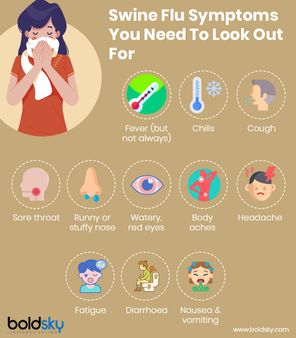
How Does Swine Flu Spread?
Even a small sneeze from an infected individual is enough for the germs to spread through the air and get stuck on to surface areas like doorknobs and furniture. In the event of the outbreak, one must be aware of the ways and means to prevent the onset of swine flu [5].
Since swine flu is transmitted through air droplets from the affected patient, maintaining proper hygiene is the basic precautionary measure one should follow. Fever, headache, fatigue, sore throat and diarrhoea are a few of the symptoms of swine flu and if these symptoms tend to elevate in a period of 4 to 5 days, go to a doctor immediately [6]. The best means of dealing with swine flu is to prevent it.
Today, we will go through some of the most asked questions regarding the swine flu outbreak.

1. How do symptoms of swine flu differ from other types of flu?
Ans: According to experts, the basic symptoms for swine flu are similar to that of the common flu [7]. However, swine flu symptoms may include gastrointestinal symptoms (diarrhoea and vomiting), as well as the usual respiratory symptoms.
The common symptoms are fever (greater than 100°F or 37.8°C), sore throat, cough, stuffy nose, chills, headache and body aches and fatigue.
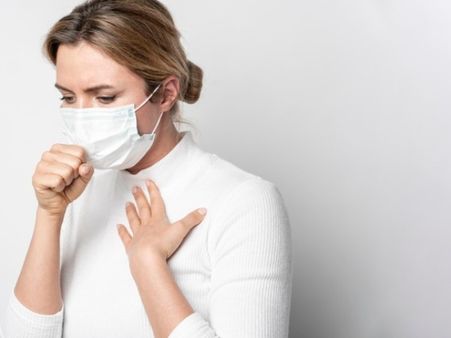
2. If I have flu-like symptoms, how would I know if it is Swine flu or not?
Ans: You or your physician really would not be able to tell the difference actually. To understand the difference, a respiratory specimen taken within the first four to five days is necessary [8].
If you are exceptionally ill with flu-like symptoms, are chronically ill, immune-suppressed, quite elderly or have a very young child, under age 2, you must contact your doctor immediately.

3. Is there medication for Swine flu?
Ans: Yes. Most people with swine flu, require only symptom relief. If you have a chronic respiratory disease, your doctor may prescribe additional medications to help relieve your symptoms [9].
Altogether, there are four anti-viral drugs that we commonly use to treat various strains of flu.

4. How long are people contagious when they have Swine flu?
Ans: Adults are potentially contagious for the length of time one has symptoms, that is, up to seven days following the beginning of the illness [10]. The shedding stage (expulsion and release of virus progeny following successful reproduction during a host-cell infection) of the virus is during the first four to five days of illness.
Children can be considered contagious longer, up to 10 days and the initial incubation period is 24 to 48 hours [11].

5. Can I start taking medicine for it now, just in case I get it later?
Ans: No. Health experts and doctors advise against it. Preventive medication might be advised for special circumstances, such as when one has been exposed to potentially ill people during an epidemic.
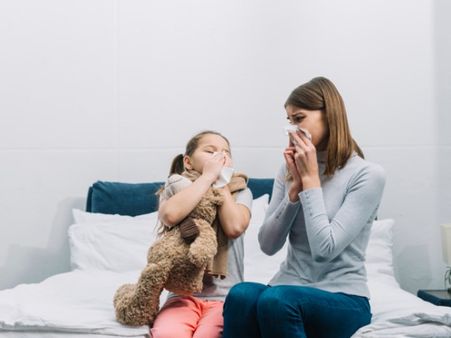
6. Are the symptoms in children different from adult symptoms?
Ans: Though the basic symptoms are similar, the signs of potentially life-threatening complications differ. It is important that you inform the hospital regarding this. Emergency symptoms in children include fast breathing or trouble breathing, bluish skin colour, not drinking enough fluids, not waking up or interacting, being very irritable and fever with a rash [12].
The emergency warning signs in adults are difficulty breathing or shortness of breath, pain or pressure in the chest or abdomen, sudden dizziness, confusion and severe or persistent vomiting [13].
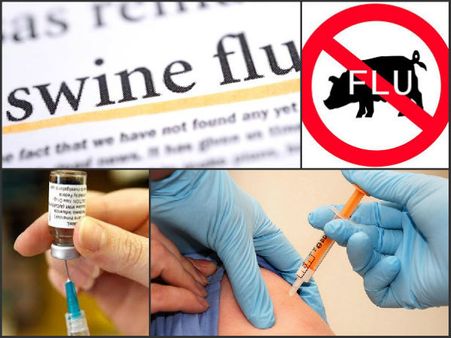
7. Is there a vaccine for Swine flu?
Ans: Yes.

8. Can I catch Swine flu from pigs?
Ans: No. This strain is one that is communicable through human-to-human contact. It is a mutated form of a swine virus [14].

9. Can I catch Swine flu from eating pork?
Ans: No. Swine flu is not transmitted by food and is not a foodborne illness [15]. An internal temperature of 160 degrees for cooked meat will kill any bacteria or virus.

10. How does it cross from a pig to a human?
Ans: The swine virus mutates, which then infects humans and get spread by humans.

11. Can Swine flu kill me?
Ans: Like other flu, Swine flu can cause serious outcomes.

12. How long does the germs live on surfaces, like on my desk if someone sneezes in my office?
Ans: Influenza virus survives only minutes on inanimate objects or hands, so these are very inefficient ways to spread the illness. However, if you shake hands with an infected person who has just wiped their nose, then there is a high risk of infection [16].

13. Other than hand washing and covering my mouth if I sneeze or cough, what can I do to take care of myself and others?
Ans: If you are ill, stay home. If you cough into your hand, wash your hands before touching anyone else. If you get symptoms suggesting the flu, call your doctor.
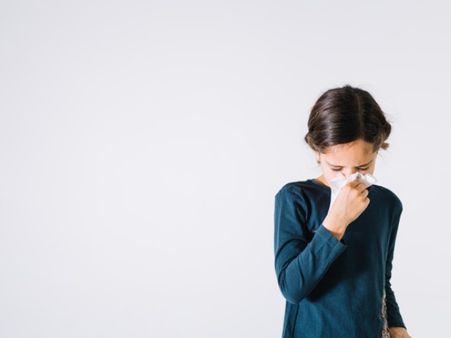
On A Final Note…
To prevent the disease, wash hands frequently, wear a mask when unwell or in the vicinity of the patient, and practise basic hygiene and cleanliness. Also, eat foods rich in vitamin C to keep your immune levels up. Be aware that eating pork will not give you swine flu any more than eating chicken will give you bird flu.
-
 wellnessTwo Swine Flu Cases In Odisha
wellnessTwo Swine Flu Cases In Odisha -
 disorders cureEverything You Need To Know About The Common Cold And Flu
disorders cureEverything You Need To Know About The Common Cold And Flu -
 disorders cureAlert! Swine Flu With Pandemic Potential Reported In China
disorders cureAlert! Swine Flu With Pandemic Potential Reported In China -
 wellnessAfrican Swine Fever: What You Need To Know
wellnessAfrican Swine Fever: What You Need To Know -
 disorders cureBird Flu: Causes, Symptoms, Risk Factors, Diagnosis And Treatment
disorders cureBird Flu: Causes, Symptoms, Risk Factors, Diagnosis And Treatment -
 wellness11 Healthy Tips On How To Prevent Swine Flu
wellness11 Healthy Tips On How To Prevent Swine Flu -
 wellness10 Home Remedies To Prevent Swine Flu
wellness10 Home Remedies To Prevent Swine Flu -
 disorders cureSwine Flu: Symptoms, Causes, Treatment & Prevention
disorders cureSwine Flu: Symptoms, Causes, Treatment & Prevention -
 newsBeware Of Swine Flu, It Can Trigger Type 1 Diabetes; 10 Best Swine Flu Preventive Tips
newsBeware Of Swine Flu, It Can Trigger Type 1 Diabetes; 10 Best Swine Flu Preventive Tips -
 newsSwine Flu: 9 Deaths, 58 Positive Cases In Punjab; How To Boost Immunity & Prevent H1N1?
newsSwine Flu: 9 Deaths, 58 Positive Cases In Punjab; How To Boost Immunity & Prevent H1N1? -
 newsSwine Flu On The Rise: Aamir Khan And Kiran Rao Latest Victims!
newsSwine Flu On The Rise: Aamir Khan And Kiran Rao Latest Victims! -
 newsH1N1 (Swine Flu): India Witness 600 Deaths, 12,500 Positive Cases Till Date in 2017
newsH1N1 (Swine Flu): India Witness 600 Deaths, 12,500 Positive Cases Till Date in 2017


 Click it and Unblock the Notifications
Click it and Unblock the Notifications



